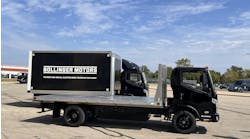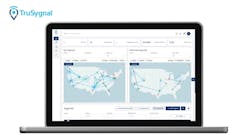XPO Inc. executives said May 4 their plans to improve service and profitability remain on track despite the weak freight trends facing the industry.
Connecticut-based XPO produced a net profit of $14 million in the first three months of 2023, with operating income excluding restructuring charges and costs related to the spinoff of RXO Inc. rising to $104 million from $76 million in early 2022. Revenues rose less than 1% to $1.9 billion, helped by more shipments per day and higher revenue per hundredweight but held back by lower volume trends, with pounds per day slipping nearly 2% from a year earlier.
CEO Mario Harik also told investors and analysts that XPO, the No. 12 carrier on the FleetOwner 500: Top For-Hire Fleets of 2023, saw “a slightly better demand environment in April” than in March as the industrial economy showed some strength. Both shipments and tonnage numbers relative to March were better than would be expected given typical seasonality: Shipments were up 3% and tonnage rose 2% month-to-month.
See also: More signs add to anxiety over rough freight economy
“We’ve seen a bit of a tick up on the industrial side, but the majority of that improvement is being driven by our initiatives, and more specifically the service improvements, we’ve driven in the network,” XPO's chief strategy officer, Ali Faghri, said on a conference call.
Faghri added that XPO’s locally oriented work is driving much of the company’s growth. In the first quarter, local shipment counts were up 9% year-over-year while the company’s national channel shipping count was essentially flat.
To keep building on some of its efficiency gains, Harik and his team have been plowing millions into upgrading their fleet. During the first quarter, XPO added more than 700 tractors to its operations and made nearly 1,800 trailers at its Arkansas manufacturing plant. The new tractors lowered the average age of XPO’s fleet to 5.2 years from 5.9 years on Dec. 31, according to the company.
See also: XPO earns big in Q4 LTL segment, reports final FY 2022 numbers
On the cost side, the XPO team has been trimming its corporate operation to account for the RXO spinout and also has been laying off some workers and managing hours worked at its field operations. On an annual basis, Faghri said, those efforts will save the company $50 million, with its less-than-truckload business accounting for more than two-thirds of that figure.
RXO, the truckload brokerage that was separately listed on the New York Stock Exchange last November, separately reported a break-even first quarter on revenues of $1 billion, down from $1.3 billion in early 2022. Adjusted EBITDA, which included about $8 million in restructuring costs, fell to $37 million from $75 million a year earlier. In a statement, CEO Drew Wilkerson said RXO’s brokerage business gained market share during in Q1 2023, with contract volume climbing 19% from early last year.
Shares of XPO (Ticker: XPO) popped nicely on the company’s earnings report: In midday trading on May 4, they were changing hands around $47, up nearly 6% on the day. Over the past six months, XPO shares have climbed 40%, growing the company’s market capitalization to nearly $5.5 billion.




